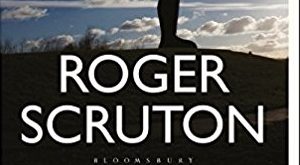15 March 2017
Where We Are
The State of Britain Now
A book by Roger Scruton
Reviewed by J R Thomas
 Sir Roger Scruton is a very rare thing – a Conservative philosopher.
Sir Roger Scruton is a very rare thing – a Conservative philosopher.
Mrs Thatcher was perhaps the last proponent of a reasoned coherent approach to Conservatism. The Iron Lady’s considerable brain, trained in science and law, liked clear precise lines of thought backed by proper research. After her 1975 elevation to the leadership she restructured the party’s approach to policy creation, under the cerebral if eccentric guidance of Keith Joseph, to formulate a philosophy from which policies would flow. This would identify sensible but free-market solutions to the many problems facing British society and economy, impress the electorate by reasoned well-argued approaches to policy at a macro level, and persuade them to accept consequent policies at the delivery level.
That seemed to work, leading to four successive convincing general election victories, and indeed generating a whole new Labour Party approach under Tony Blair. Since Mrs T. the Tory Party has not been led by people who one would describe as great thinkers, and an incoherent philosophical approach is demonstrated by what can be politely described as an opportunistic, ragbag indeed, approach to policy.
Into that void steps Roger Scruton; indeed he has so stepped several times and generally controversially, and at the cost of his career in academia. Philosophers and great thinkers are, though, often best unshackled from institutions, certainly in this era of safe-speak and safe-spaces. Philosophers have, like us all, to put bread on the table, and their independence (unemployment, perchance) benefits us all by encouraging them to speak and publish their thoughts, but in an accessible way that sells.
Sir Roger has become something of a master of that, as he shows in his latest publication Where We Are. Scruton has often been mischaracterised as a libertarian, by those who presumably have not heard him or read him. But, whilst believing free enterprise to be an essential component of a free society, he also fears the power of unrestrained capitalism; he is very much Burkean in his approach, cynical about change, cautious about new ideas, and convinced of the importance of traditional structures in maintaining stability and happiness. Not surprisingly, he is no admirer of the European Union, attesting it as undemocratic, centralising, and bureaucratic. It is, he says, taking away ancient allegiances and comforts and not really replacing them with anything.
Such views might be heard in a Home Counties pub from that proverbial retired major leaning on the bar. But Scruton is much more than that, and Where We Are sets out not so much what is wrong, but why it is so, and how we might adapt governance to the digital society. Old allegiances are in any case under threat he says; people no longer get their social life from their suburb or street, but from their Facebook friends and their virtual groupings. But our need for identity means that the nation state becomes more important not less; we need to be able to maintain clear self-identities and understand who our neighbours truly are. Change at too great a rate remains dangerous, and if government becomes too remote, imposing on us the views of a faraway elite which thinks it knows best, then our democracy and stability is at risk. The strength of the British system is that the law, policy, and the legitimacy of government comes up from the will of the people, not, as in many mainland European countries, down. The British allot certain rights to their government, even to their monarch; in France (for example) the government permits the people actions at its pleasure.
Where We Are is in a strange way an argument for populism, or at least a plea to the elite to get down with the common people and recognise the frailties of the human condition. If we are to continue as a free open society, to adhere as a democracy, then we need much more understanding and willingness to compromise; to make haste a lot more slowly – and thoughtfully.
“Where We Are; The State of Britain Now” by Sir Roger Scruton is published by Bloomsbury and is widely available in good bookshops now, RRP £14.27


